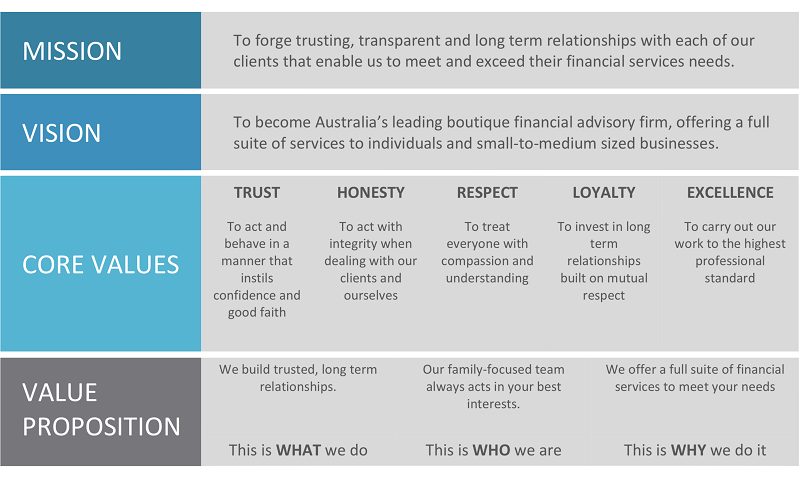Welcome to the latest edition of our Exchange Newsletter.
Despite some challenging conditions both here and overseas (bushfires, coronavirus, unpredictable markets etc.), we hope you’ve had a safe and productive start to 2020.
In this edition, we begin by sharing our company’s recently updated mission, vision, core values and value proposition. We then review the government’s recent stimulus package in response to the ongoing coronavirus threat and how the package will benefit Australian trading companies.
And finally, we focus on some current market issues, including low cash rates and incentives being offered by banks to entice you to refinance your home loan.
Enjoy the read!
Defining who we are
At Financial Decisions, we’ve recently updated our mission statement, vision, core values and value proposition to better align with who we are, what we do and why we do it. Here’s the result:

It’s important that we share this with you so you clearly understand the attitudes of our staff and what you can expect when dealing with the Financial Decisions team.
The Australian Government’s stimulus package for business
On 12 March 2020, the Federal Government announced a $17.6 billion economic stimulus package to help support the Australian economy as we deal with the ongoing coronavirus threat.

Here we list some of the key benefits for SMEs right through to large trading companies:
Instant asset write-off
If a business purchases an asset worth up to $150,000 between now and 30 June 2020, the cost of the asset will be fully depreciable on purchase ($30,000 was the previous threshold).
15-month investment incentive
If a business purchases an asset worth more than $150,000 between now and 30 June 2020, 50% of the cost is deductible upfront, with the remaining 50% in accordance with existing depreciation rules.
BAS refunds and credits
For the March and June BAS periods, any PAYG withholding paid to the ATO will be refunded at the rate of 50% or up to $25,000 by way of a credit against the quarterly BAS.
Wage subsidies
Businesses will receive a wage subsidy of 50% up to a maximum of $21,000 when they hire apprentices or trainees for up to nine months.
Other relief measures
Businesses can also benefit from deferral of payment dates by up to four months, converting quarterly GST reporting to monthly reporting to receive GST refunds sooner, the ability to vary PAYG instalment amounts to zero, remission of any interest penalties incurred on or after 23 January 2020, and allowing businesses to adopt low interest rate payment plans.
Note: Payroll tax is a State-based tax and the payroll tax holiday announced only applies to businesses operating in QLD. No such announcements have been made by OSR NSW as yet.
Banks offering customers up to $4,000 cashback to refinance
The major banks have recently ramped up their efforts to attract new business by offering customers up to $4,000 cashback to refinance their home loans.
Westpac, St.George and NAB have all gone to market with attractive cashback incentives on a range of home loan packages.

Westpac is offering $2,000 cashback for customers who purchase a new Owner Occupier or Investment Property loan with the Premier Advantage Package or Flexi First Option Home Loan. They’re also offering $2,000 cashback on the Premier Advantage Package or Flexi First Option Home Loan for customers who refinance their home loan to Westpac from another lender.
St.George has raised the bar by introducing a refinance cashback offer for new refinance applications received by 31 March 2020 on their Advantage Package and Basic Home Loans. Eligible customers will receive $4,000 cashback for their first refinance application, plus a bonus $2,000 for every additional property refinanced.
And not one to miss the party, NAB is offering customers a $4,000 cashback bonus when they refinance their home loan to NAB, as well as a $2,000 home buying cash bonus for eligible home loans over $250,000.

Wade Stanley
Thanks to this aggressive push from the banks to attract more business, brokers and their clients now have some tempting cash incentives to take out a new home loan or switch an existing one.
To find out more, please contact our new Mortgage Adviser, Wade Stanley, on 0415 993 444.
Alternatives to cash in a low rate environment
With interest rates at historic lows, cash is an unattractive investment option for most people. So what are the alternatives to cash and what level of risk do each of them carry?
Let’s take a look at six alternative options…
- Bank bills / Short term treasury notes
Similar to a cheque, bank bills and treasury notes are effectively a ‘bill of exchange’ that come with a specific date in the future when they’re payable (i.e. the maturity date). Upon maturity, an investor redeems their investment at face value.
Bank bills and short term treasury notes tend to carry low risk, however they’re generally only accessible to institutional investors.
- Government bonds
When you invest in government bonds, you’re effectively lending your money to the government. In return, you receive regular interest payments, and if you hold the bond until maturity, you get back the face value of the bond.
Government bonds are considered to be a defensive and low risk asset that can provide a stable source of income for investors, however there are some risks associated with term lengths and fluctuating interest rates.
- Corporate bonds/notes
Similar to a government bond, a corporate bond or note is where you ‘lend’ your money to a company for a specific period of time. In return, you receive regular interest payments, and if you hold the bond until maturity, you typically receive the face value of your investment.
Corporate bonds carry a higher level of risk than government bonds. That’s because a company may go out of business, leaving you with no interest payments or principal.

- Hybrid securities
Issued by companies, banks and insurers, hybrid securities are a type of security that combines elements of both debt and equity securities i.e. bonds and shares.
Hybrid securities can provide an income (like bonds), however their value can also fall (like shares). And because they generally pay a fixed or floating rate of return until a specified date, there’s no guarantee on the amount and timing of interest payments. For these reasons (and the fact that they’re exposed to more market volatility), hybrid securities carry more risk than the investment options outlined above.
- Mortgage backed securities
Mortgage backed securities are managed funds that own various commercial and residential mortgage backed securities bonds. Secured by a mortgage or a collection of mortgages, investors receive principal and interest payments from the borrower as they pay their mortgage each month.
Mortgage backed securities carry higher risk than government bonds as the borrower or borrowers can default on their payments, resulting in a loss of income and capital.
- Second tier lenders
Second tier lenders enable investors to invest in individual first mortgage loans backed by commercial property. Loan terms are usually less than two years, with investors receiving interest payments during the term and the principal paid in full at maturity. Second tier lenders usually have higher interest rates than traditional banks, however they tend to have higher borrowing limits and provide the funds more quickly than most banks.
These investments carry higher risk than cash or bonds as the borrower or borrowers can default on their payments, resulting in a loss of income and capital. What’s more, there’s a liquidity issue, as investors can’t access their capital until the loan has been repaid in full or the underlying asset sold.
Final Word
It’s important to remember that while each of the above options carry relatively low risk when compared to shares or property, none of them are at the same low risk level as cash. Unlike cash, there’s no guarantee of getting principal and interest back should there be a market dislocation, which is why cash is still an important component of any diversified portfolio.
Let’s Chat
Financial Decisions can help you with wealth management, superannuation, estate planning, mortgages, tax and accounting, and life insurance. To find out more about our services, please contact your adviser or call us on (02) 9997 4647.
Disclaimer: This publication has been compiled by Financial Decisions (AFSL/ACL Number 341678). Past performance is not a reliable indicator of future performance. While every effort has been taken to ensure that the assumptions on which the outlooks given in this publication are based on reasonable data, the outlooks may be based on incorrect assumptions or may not take into account known or unknown risk and uncertainties. Material contained in this publication is an overview or summary only and it should not be considered a comprehensive statement on any matter nor relied upon as such. The information and any advice in this publication do not take into account your personal objectives, financial situation or needs. Therefore you should consider its appropriateness having regard to these factors before acting on it. While the information contained in this publication is based on information obtained from sources believed to be reliable, it has not been independently verified. To the maximum extent permitted by law: (a) no guarantee, representation or warranty is given that any information or advice in this publication is complete, accurate, up-to-date or fit for any purpose; and (b) Financial Decisions nor its employees are in any way liable to you (including for negligence) in respect of any reliance upon such information or advice. March 2020
Contact: Financial Decisions PO Box 484 Mona Vale NSW 1660, T 02 9997 4647, F 02 9997 7407

